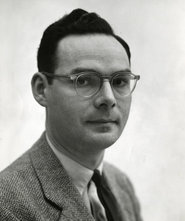By Chris Conway
Austin C. Wehrwein was in a hotel room, somewhere in Canada.
The year was 1952. He’d been given an assignment from his newspaper, The Milwaukee Journal, to write about the economic boom in Canada.
The bookish man, with thick-rimmed glasses and degrees in economics and law, was typing. He was working on a story about the Canadian economy – something many Americans had never heard about.
Wehrwein would do this 25 times across Canada. The series of stories that resulted would win him a Pulitzer Prize.
He won the Pulitzer Prize for international reporting in 1953 for a series called “Canada’s New Century.”
“The 20th century belongs to Canada,” wrote Wehrwein in the first article of the series. Wehrwein thought it was important to tell the story of Canada’s development to Americans. Canada held a wealth of natural resources and was growing rapidly.
“[America] must face the fact that while we grow poorer by the hour in natural resources, Canada grows richer,” wrote Wehrwein.
The Canada Wehrwein described was the first exposure many Americans had to the country. It was a burgeoning economy filled with plentiful natural resources.
According to an obituary in The Milwaukee Journal Sentinel, Canadian officials said the series was a “most lucid and observant account” of the Canadian economy.
Wehrwein’s colorful and engaging writing made the stories approachable to American readers.
“The writer’s leg work, plus good writing and know-how brings our neighbor to the north into the house,” the Pulitzer jury said, putting Wehrwein’s series at the top of their list.
The success didn’t come overnight, though. Wehrwein bridged the gap between law, politics, business and opinion over the course of his career, writing for a string of publications.
“He was a bit of a loner,” said Judith Wehrwein, Austin’s wife. “Journalism and his job were his first, second and third priorities.”
Wehrwein earned a degree in economics in 1937 from the University of Wisconsin and a law degree from Columbia University in 1940.
Although he passed the Wisconsin bar exam, but he went into journalism after spending his adolescence working at newspapers – first as the editor of his high school newspaper, then as a university correspondent for The Milwaukee Journal in college.
“He never really got away from his interest in journalism,” said Judith Wehrwein, adding that he never actually practiced law.
He worked at the Associated Press’ Madison, Wis., bureau and the United Press’ Washington, D.C., bureau prior to World War II. He covered the government and the Supreme Court.
During the war, he worked in public affairs for the military. His work in public affairs took him to Europe and China; he met his future wife, Judith, in London while working as part of the Marshall Plan.
“He was interested in the world,” said Judith.
In 1951, Wehrwein, newly married to Judith, returned to the United States and wrote for the Milwaukee Journal’s business desk. He would quickly win the Pulitzer.
After winning the Pulitzer, he had stints as a writer at Time magazine and The New York Times and as business editor for The Chicago Sun-Times.
In 1966, he started as an editorial writer at The Minneapolis Star.
Being an editorial writer perhaps fit Wehrwein best. Beats were loose, and he could write about whatever topics he found interesting. Often, those topics were the law, economics, higher education and politics.
“He was an exceptional observer of American society and all its expressions,” said Kate Stanley, a former editorial writer at The Star. “He could find interesting stories in an empty cardboard box.”
Whenever Wehrwein wanted to slip out of the office to find his next story, he would sling a spare overcoat over his desk chair and place a spare pair of galoshes by the door, giving the impression that he was simply elsewhere in the office.
But instead he could be gone for hours, sitting in on meetings or wandering around downtown Minneapolis, looking for something he found interesting, said Stanley.
He was curious. He was bright. He wanted to tell a good story, and he wanted to tell the truth.
“He started [his journalism career] telling the truth he felt needed to be told,” said Stanley. “But his career evolved so that he ended up interpreting the truth that he felt everyone should know.”
Wehrwein retired from The Minneapolis Star in 1982, but continued to write for a number of publications into his 80s.
Wehrwein died in 2008. He was 92.
Chris Conway is a journalism and political science major from Wilmington, N.C., in the Class of 2015 at UNC-Chapel Hill.
